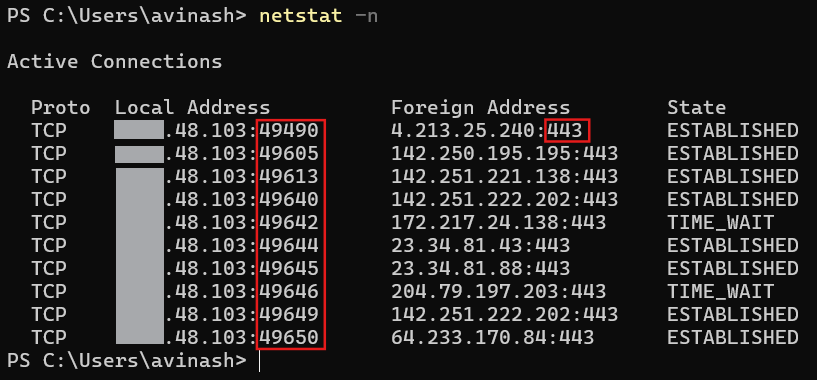Port Numbers
What Exactly Are Port Numbers?
Port numbers are essentially just addresses for services or applications running on a device. They are combined with the IP addresses eg: 192.168.10.2:443
Why Do We Even Need Port Numbers?
We all know that IP addresses are used so one computer can find another computer across a network. But what after that?
For Example let’s say you open your browser, and search for a Website. Here’s what happens:
- Your request goes to Website’s server using IP (the website name was converted to IP using DNS)
- Now inside the server, it checks Which Port to go to - here it’s 80/443 (the Website at http/https)
- The data comes back to your PC using your IP address
But now, Where should this data go once it reaches your PC?
Your OS assigns a Random Temporary Port known as ephemeral port for that specific connection or session at the time of sending request. These ports are in a range between (49152-65535).

- You can run
netstat -nin your terminal to see all the Port numbers you are connecting to(443), and which port your Device is using(49490) to connect to that. - Here you can see in the Foreign Address that the Port numbers are 443(https), and my Device will send the request to this port 443 on other server/device.
- And in Local Address the Port numbers are all more than 49152, and our Device will receive the response to the request it made on this port.
So, If I don’t connect to Internet at all. Would Port Numbers still be of any use ?
YES they still be useful.
I am not requesting any data from the internet, so it doesn’t need to find any services on my device then Why?
It’s Because Your computer uses something called loopback communication to talk to itself. When two or more services/processes inside your computer need to share data, they communicate by sending information to each other’s designated ports.
Example: Local Web Development
Most of us have at least once in our life hosted a simple HTML website locally when learning web development. To see how it looks, we deploy it locally.
Remember this familiar sight: localhost:8000 OR localhost:8080
Since localhost can be written as 127.0.0.1, this becomes: 127.0.0.1:8000
So, What’s happening here?
- We’re deploying our site locally on
127.0.0.1:8000 - Our webpage is listening on port 8000
- When we open our web browser and type
127.0.0.1:8000, the browser connects to that port (8000) and shows our website
Remember: This all happens locally without internet, so we still need port numbers even without an internet connection!
Key Takeaways
- Port numbers act as specific addresses for services running on a device.
- They work alongside IP addresses to ensure data reaches the correct application.
- Port numbers are essential for both network communication** and local services**
- Even without internet, your computer uses ports for internal communication between services.
- Any port can technically be used for any service, and running standard services on non-default ports—such as HTTP on port 22—is considered unusual but it is possible.
- Common ports include:-
Port 22 SSH
Port 25 SMTP
Port 53 DNS
Port 80 HTTP
Port 443 HTTPS - Port numbers range from 0 to 65535
(0–1023) Well-Known Ports
(1024–49151) Registered Ports
(49152–65535) Dynamic/Private Ports